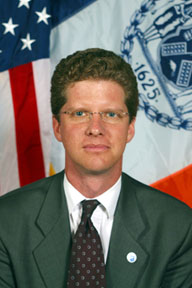Hope for affordable housing?
 President-elect Barack Obama has chosen Shaun Donovan as the next secretary of the Department of Housing and Urban Development. A Harvard-trained architect, Donovan worked at HUD in the Clinton administration and most recently served as New York City's Commissioner of Housing Preservation and Development, where he oversaw the largest affordable-housing plan in the nation.
President-elect Barack Obama has chosen Shaun Donovan as the next secretary of the Department of Housing and Urban Development. A Harvard-trained architect, Donovan worked at HUD in the Clinton administration and most recently served as New York City's Commissioner of Housing Preservation and Development, where he oversaw the largest affordable-housing plan in the nation.The appointment is earning raves from affordable housing advocates, including National Low Income Housing Coalition President Sheila Crowley. She called Donovan "a brilliant choice for HUD," pointing to his track record of accomplishments and the respect he's earned from a variety of housing interests, from advocates for the homeless to financiers:
"Shaun is uniquely qualified to take on one of the most challenging jobs in the Obama Administration. The country is in the throes of a recession precipitated by the foreclosure crisis, which must be solved. Foreclosures and the recession are causing a new surge in homelessness which the new Administration and Congress must act quickly to stop by increasing the supply of rental homes affordable to the lowest income families. And HUD as an agency has been sorely neglected for the last eight years and needs leaders who are committed to its mission."Donovan will inherit an agency plagued by scandal during the Bush administration. After President Bush's original HUD secretary, Mel Martinez, stepped down to run for a U.S. Senate seat in Florida, he was replaced by Texas native Alphonso Jackson. But Jackson came under fire for his comments during an April 2006 meeting in Dallas that he would not offer contracts to anyone who didn't support Bush politically. A HUD inspector general's report found that Jackson personally intervened against contractors with Democratic affiliations, but turned up no proof that Jackson's staff obeyed his wishes.
Jackson also landed in a less-than-flattering spotlight after the Washingon Post reported on a series of e-mails that suggested HUD's top brass tried to punish the director of the Philadelphia Housing Authority for refusing to turn over property to a development company owned by a friend of Jackson's, though a judge eventually ruled that HUD had acted legally. And Jackson raised eyebrows for allegedly getting below-rate loans from Countrywide Financial because he was considered a friend of its chief executive.
Donovan will face enormous challenges at HUD. Besides addressing the nation's mortgage meltdown, he will have to tackle the housing crisis on the Gulf Coast created by a series of devastating hurricanes over the last several years -- and exacerbated by the Bush-era HUD's decision to tear down public housing in post-Katrina New Orleans without replacement units ready to go.
To help fix the nation's dysfunctional housing policy, Crowley's organization recently submitted a proposal [pdf] to the Obama transition team for a low-income housing initiative to be included in the economic recovery plan. It includes the following policy suggestions:
* Capitalize the new National Housing Trust Fund at $10 billion for two years to rehabilitate or build 100,000 rental homes for the lowest income households using green standards.
* Fund 400,000 new Housing Vouchers at $3.6 billion for two years to provide the lowest income households with rent assistance.
* Fund the homelessness prevention component of the Emergency Shelter Grant program at $2 billion for two years to prevent low income households from becoming homeless and to rapidly rehouse those that do lost their homes.
* Fund the Public Housing Capital Fund at $5 billion for two years to upgrade public housing using green standards.
* Provide $3 billion for two years to upgrade federally assisted multi-family housing using green standards.
Tags
Sue Sturgis
Sue is the former editorial director of Facing South and the Institute for Southern Studies.
